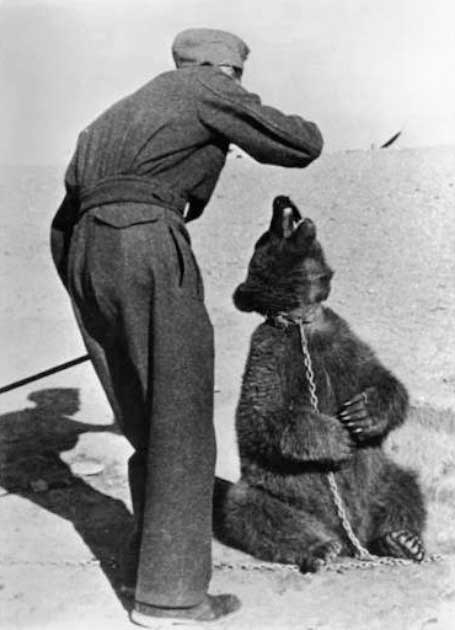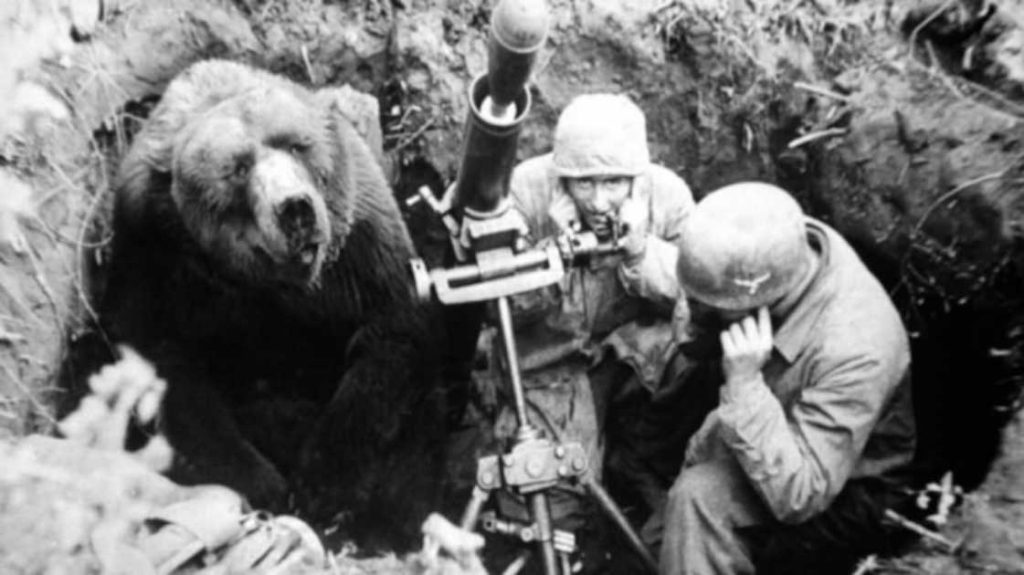Following the Soviet Invasion of Poland, 16 days after Nazi Germany invaded Poland in 1939, the Red Army took over 31,000 Polish people as prisoners of war. The NKVD (Наро́дный комиссариа́т вну́тренних дел) sent hundreds of thousands of people to Siberia and the more remote parts of eastern Russia to be imprisoned in gulags or killed en-masse.
The Russians, allies of the British, realized the invasion was not good for international relations and released around 100,000 Polish POWs. These men were to be evacuated through the Middle East and join the British military.
Who Was Corporal Wojtek?
Corporal Wojtek (pronounced VOY-tek) was a member of the Polish II Corps, 22nd Artillery Supply Company. Corporal Wojtek had been known for boosting the morale of his brothers in arms and was a hero during the Battle of Monte Cassino in Italy in 1944.
Corporal Wojtek might not be a name you have heard before, and he sounds like a regular soldier, but there was nothing ordinary about this soldier. Corporal Wojek was a bear. An actual Syrian brown bear who was an enlisted soldier in the Polish army.
In April 1942, Corporal Wojtek had joined the Polish army after he was purchased from a boy in Hamadan, western Iran, as a gift for a family member. When he was sold, Corporal Wojtek was still an infant and was assumed to be an orphan.

Wojtek was raised by that family member in a refugee camp near Tehran for three months before being “donated” to the 22nd Artillery Supply Company, and they named the cub Wojtek. They took him in as their own.
Corporal Wojtek and The 22nd Company
The soldiers of the 22nd Artillery had grown fond of the still small bear and considered him part of their unit. The men named him Wojtek, a nickname for the traditional Polish name Wojtek, the name itself means Happy Warrior, and the men were glad to have a fun pet.
The men in the 22nd Artillery didn’t have much of a clue about how to care for Wojtek, and he developed a strange diet. Wojtek was fed syrup, fruit, honey, and marmalade (just what every growing young bear needs, right?). The soldiers gave him beer, which quickly became his favorite drink.
He slept with the soldiers if they got cold at night and drank coffee with the 22nd Artillery every morning. The bear enjoyed cigarettes that he would either smoke or eat and liked to wrestle the soldiers for fun. During these formative bear years, he started to act like his caretakers.
The 22nd Artillery taught Wojtek how to salute and would often stand on his hind legs just like the soldiers in an attention position or march on two legs with them. After being surrounded by men, he began to act like one. However, he was still very much a growing bear who grew too big to wrestle with the soldier and was assigned a personal handler to look after Wojtek. Wojtek became the “unofficial” mascot of the 22nd Company.
After traveling through Egypt, Wojtek and the 22nd Artillery Supply Company members were reassigned to Italy to fight with the British army. There was one small problem, the British transport ship that was going to take them to Italy had a very strict “enlisted soldiers only. No pets allowed” policy.

The 22nd Artillery had raised and loved Wojtek, and they refused to leave him behind in Egypt. To circumvent port authority, Wojtek was drafted into the Polish Army. He was now Private Wojtek.
Private Wojtek, a bear, had his military rank, ID number, paybook, and food rations (that were doubled). He traveled with his regiment across Italy, sitting on the back of a truck in a special wooden pen that the soldier would sometimes sleep in.
Members of the 22nd Company fondly recalled the time when Private Wojtek jumped out of the truck and headed towards the beach on Italy’s coast. The beach was full of sunbathers, and they were surprised to see a six-foot-tall, 450-pound (204 kg) bear running for a quick dip in the ocean. The soldiers said that Private Wojtek left the beach after a quick swim and got back into the truck on his own. It was a sweltering day, and Wojtek couldn’t bear the heat anymore.
Private Wojtek’s service in Italy wasn’t full of beach parties and swimming, and he saw battle. Private Wojtek was promoted to Corporal Wojtek after the Battle of Monte Cassino. During the battle, he helped carry 100lb (45kg) ammunition crates full of 25-pounder (11 kg) artillery shells.
It ordinarily took four men to carry the crates, but Corporal Wojtek would walk on his hind legs, a box held in his arms and paws. He helped pass ammunition to soldiers with the rest of the 22nd Artillery Supply Company members without dropping a single crate.

Corporal Wojtek followed what his other company members were doing around him and would grab a crate and carry it to a truck and stack them just like the soldiers. To show recognition to Corporal Wojtek and his popularity, the 22nd Company changed its official emblem to one that depicts a bear on his hind legs carrying an artillery shell.
Retirement
After the war, the men in the 22nd Company and Corporal Wojtek, who outranked the two men assigned to care for him, moved to Berwickshire, Scotland. Wojtek was popular with civilians and other men stationed at Winfield Airfield near the village of Hutton, on the Scottish Borders.
So popular that the Polish-Scottish Association inducted Corporal Wojtek as an honorary member. Unfortunately, the 22nd Company made the sad decision to leave Corporal Wojtek behind at the Edinburgh Zoo in 1947. The men were unsure what would happen to their mascot when they returned to Poland. They were concerned about the Russians stealing him.
Corporal Wojtek lived the rest of his life in Edinburgh Zoo and would often be visited by journalists and his former army friends. The soldiers would toss the bear a cigarette (lit and unlit) and an open bottle of beer when nobody was looking for a treat, as he once enjoyed when he was a soldier.
Corporal Wojtek died in December 1963 at the age of 21 from damage to his esophagus, possibly the result of swallowing lit cigarettes for years. Since his death, statues of Corporal Wojtek have been erected in Krakow, London, Weelsby Woods in England, Cassino in Italy, Edinburgh, and Duns in the Scottish Borders near the base the dear corporal served at towards the end of the war.

It needs to be mentioned that Corporal Wojtek was a victim of blatant animal abuse (forced to drink beer and eat cigarettes) by the men in the 22nd Company. However, at the time, it was seen as harmless fun.
Corporal Wojtek was loved and spoiled by the soldiers in the 22nd Company because Wojtek was so much more than a bear who did tricks for them. The 22nd Company was made up of Polish prisoners of war who were released from Soviet gulags. Gulags were known for disease, harsh physical and environmental conditions, and death.
Of the Poles captured during the Russian invasion and sent to the gulag at Kolyma in 1940-1941, only 583 men survived out of the original 10,000-12,000 Poles sent to Kolyma. The men were thrown out in the middle of nowhere, most likely starved and weak, to return to home and families.
The POWs didn’t know what became of their homes and families after being captured. They believed they no longer had a family to return to. Corporal Wojtek became their family.
His silly antics of sneaking into the showers and turning the water on by himself, leaping out of a car to swim in the ocean in Italy, and chasing after and eating the oranges the soldiers used for grenade practice were a bright spot for the Company. He was trained to lift up new soldiers to the company and hold them in the air to make the new recruits think this giant bear would eat them.
Many soldiers who raised Corporal Wojtek would later speak to journalists about how the bear gave them something to live for. All those small moments in which the men in the 22nd Company could forget about the war. Or their uncertainty about going to a home that may not be there anymore. Corporal Wojtek was a bright spot in a very dark war.
Top Image: Corporal Wojtek (second from right) and his colleagues. Source: Pouazity3 / Public Domain.
By Lauren Dillon